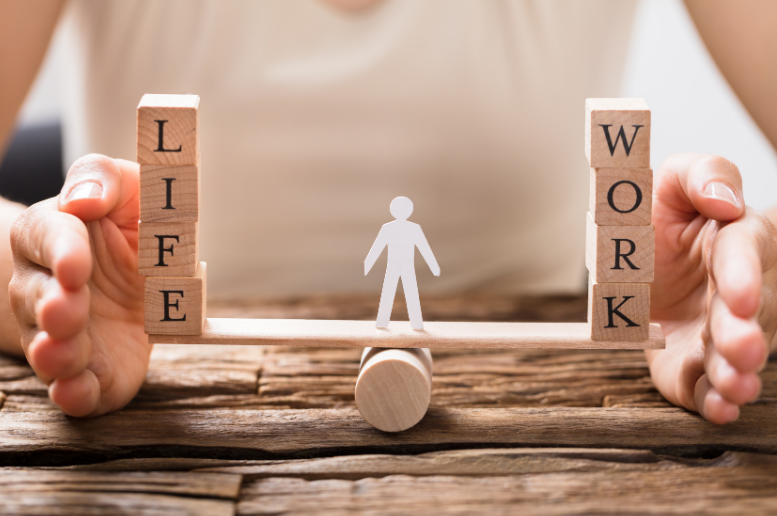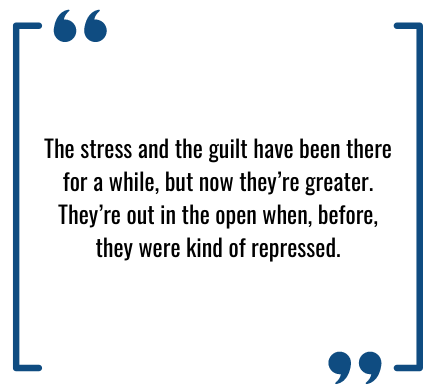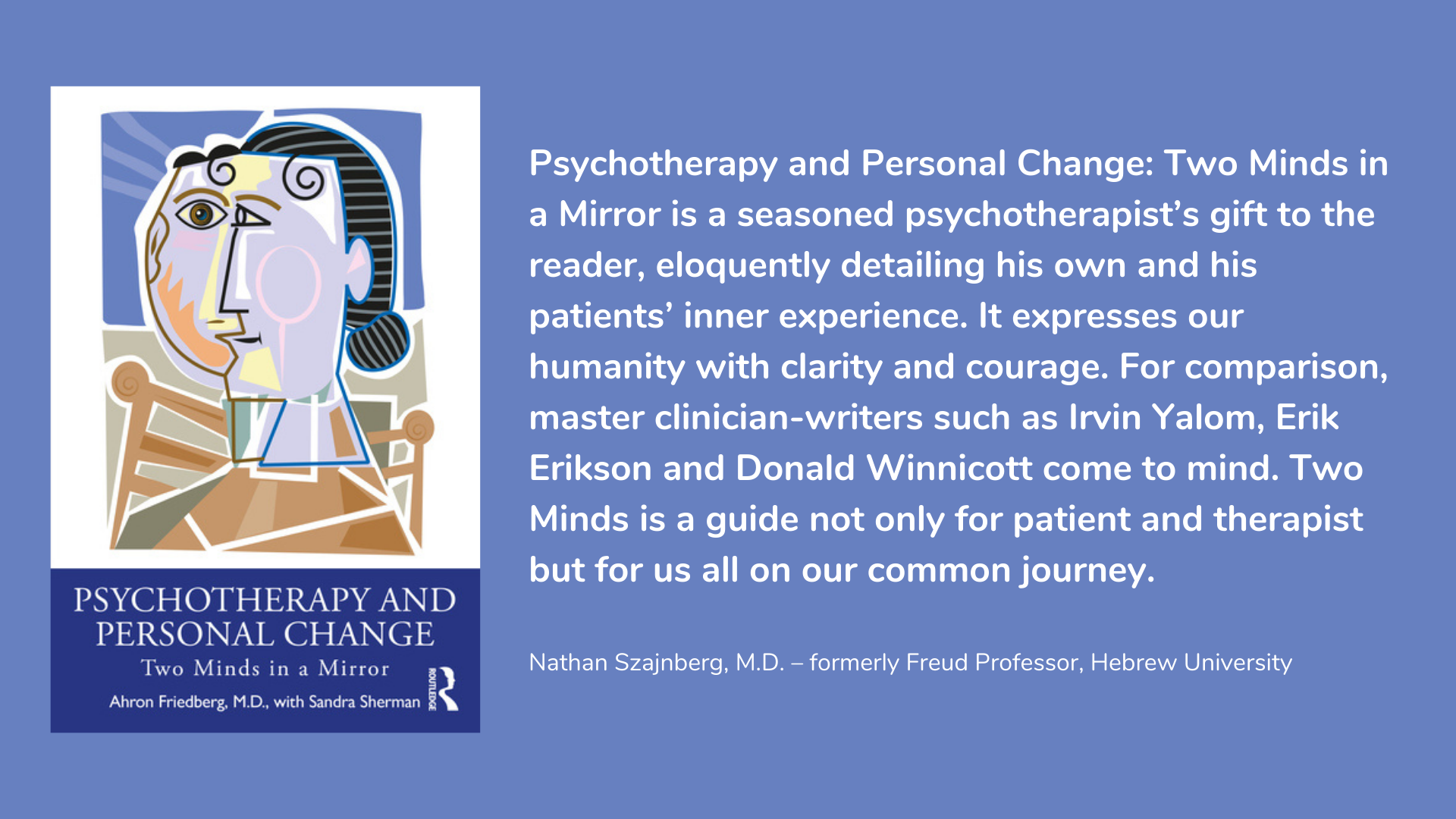Why 'Work' and 'Life' Can't Always Be Easily Separated
In pursuing happiness, you have to balance
work with the rest of your life.
During the pandemic, working from home made many bad relationships worse.
Take the case with my patient Jock, a film producer I’ve worked with for years. He’s married to a partner at a law firm, Lise, who works 80-hour weeks. One of their two boys is moderately autistic, and may never live independently. But when Jock worked on-site and the kids were in school, the family bumped along. He resented Lise’s frequent nights at the office (“She actually has a convertible sofa!”), and her travel to client meetings (“Why can’t lawyers just Zoom?”), but there was always help in the evenings. Always “was.” The situation was just waiting for COVID to disrupt it.
In fact, since the lockdown, Jock has been stuck at home; the kids have no summer activities; and Lise is afraid to admit outside help. Jock’s domestic duties have doubled. He refers to himself as a house husband who happens to produce movies. Or tries to.
It’s not that Lise is still at her office. It’s just that when the family moved to their country home, she took the office with her. She now spends 12-hour days on the computer, and starts calling China at 6 a.m. Shortly after the move, Jock thought things would improve (“Well, at least she can’t travel”), but they didn’t. “If anything, they’re worse,” he said. “She’s here but she isn’t.” He feels like she’s snubbing him. The resentment has grown.
When Jock came to see me (on Zoom), he’d ramped up his drinking. He said he’d always enjoyed a drink, like when he huddled with the writers on a script—so what? But now, without the usual professional constraints, it had become a problem. At first, it was just a beer when the kids went to bed; then he added one while they were having supper; then when they were having lunch and supper; then there was the night-cap—a few shots of scotch. Lise was incensed. She warned that she’d throw him out and divorce him if the drinking didn’t stop. He really tried to stop. But when Lise was away on travel (yes, during the pandemic), he relapsed. When she called one night, he was passed out on the couch. The younger boy, around 10 years old, answered and described the situation. When she returned, she insisted that he leave. He returned to their apartment in the city.
Now they’ve been separated for several weeks. He speaks on FaceTime with the boys every day, and he visited them one of the weekends. He’s sobered up and joined AA (virtually). But AA was not a great fit for his binge drinking and, even though he’s committed to sobriety, he envisions the inevitable relapse. “Look,” he said, “I had too much of the kids, and now I don’t have enough. Either way, it’s stress.”
Worse still, when he’d visited over the weekend, his wife rejected his affection. Sex with Lise had been so-so for several years, but Jock had told himself that was due to her punishing schedule. But now, she made clear that they’d drifted apart for good. “She said, ‘Maybe it’s my fault. But I don’t have the time or the interest to work on it.’” When he got back to Manhattan that evening, predictably he drank three scotches in an hour.
When we next spoke, I asked about what he hoped might happen. He said that he loves his kids, which he clearly does, and thought it was better that they all be together. He even reaffirmed his commitment not to drink. But then he paused, and said, “You know, it’s hard when your wife doesn’t want you. I’m actually sort of stuck.”
Indeed, he was. Marriage is hard enough when you’re raising typical children. Disabled kids add a new dimension of responsibility and commitment. So, we spoke about whether Lise’s obsession with work might have been her response to (retreat from) the stress of her son’s disability. We spoke about whether her rejection of Jock was a type of displaced guilt, since he had accepted the responsibility of raising their son, however imperfectly. I said that since the pandemic, with the usual buffers now removed, all of this is out in the open.
That made sense to Jock. He asked, with a hint of absurdity, “So, you think the vaccine will get us back to where our pathologies are just simmering?”
No, actually. What wasn’t said, now has been. They appear to have crossed a line.
So, Jock is living apart from his wife and kids. He spoke with her a couple of times, but she was indifferent to patching things up. “She doesn’t want me back,” he acknowledged. He said that even though they loved each other, it was—at least for her—an “abstraction,” a memory of how they once were. “That was before the kids and the partnership.” He said that had the virus not hit, they might have continued a while longer. “But I guess this has crystallized everything. She basically wants a lover, not a family with responsibility.”
So, at least in Jock’s mind, the virus accelerated what would have happened anyway. He said he’d probably known about Lise’s feelings for years, but hadn’t wanted to face it. “Maybe that’s another reason I started to drink—the kids, of course, but also that growing sense that we were finally breaking up.”
“Did Lise know too?” I asked. “Maybe,” he said, “but she was too busy to care, and I made it easy for her.” The problem, I thought, was that Lise never knew how to set boundaries. She was all-in or absent. She chose absence, if just to protect herself.
Over the years, I’d met with them a few times as a couple, and it helped—for a while. But Jock was now pretty sure that nothing would help, and that it was probably just as well. I asked if he thought this was OK for the kids. “No, but what’s the choice? Kids pick up on a bad marriage, and I can’t put them through that.” He thought maybe she’d find someone else once the pandemic was over.
In this time of COVID, a lot of relationships experience external stresses that exacerbate the stress that already exists. You could say that people are finding themselves in the process. But they are also losing what has mattered to them for a long time. Will there ever be a vaccine against that?
The situation between these two is complicated. It demonstrates how “work” is not some isolated function. Rather, it affects (and is affected by) every part of our lives. Here, Jock and Lise’s respective work commitments fell out of sync. She withdrew from her family into work; he had to cope with work while trying to care for the family. An atypical child made matters even more difficult. What matters now is whether, after what is likely to be a divorce, Jock can pick up the pieces of his life. That is, can he begin pursuing happiness? How, when?
I cautioned Jock not to lose himself in work, which was Lise’s major redoubt, just to avoid the pain he still suffers. Work can be a temptation. It’s more respectable than other ways of drowning our sorrows (Jock is still on the wagon, but it’s shaky), and it provides real self-affirmation when we seem to have failed in other respects. But it should never just be an excuse. I thought that after a period, as Jock got his bearings back in the city, he should consider some emotional refurbishment. At the very least, if he could relate to another woman, he’d be less inclined to drink.
We started talking about how, with a new person, he’d go about ensuring (or trying to ensure) that their attitudes towards work would not likely diverge. Jock is attracted to strong, successful woman and, before he had children with Lise, he thought he’d found the perfect match. Now, however, he realizes that how someone calibrates work with the rest of their life will affect their compatibility with someone else. Work is that central to who we are.
Moreover, it’s not just that someone might work 12 hours a day, but whether work may become an instrument of emotional withdrawal. That’s hard to know. But you can listen to how someone talks about work. If they seem to find their identity in work (“I live to write,” “I live for pathology”), then maybe you need to think twice. If a person is so wrapped up in work that they can’t understand themselves without it, then making room for anything or anyone else may seem like a threat. At the very least, as in the case of Lise and Jock, it may seem uninteresting. What interested Lise most, was herself, which she defined through her work.
In other words, a partner can be strong and successful, and still emotionally committed. They can still be there for someone else. It’s hard, but millions of people do it. Jock told me that his experience with Lise made him question his feminist bona fides. “Would I really have done better,” he asked, “if I’d married someone with an ordinary job?” I said I didn’t think so. Lise was definitely high-powered, but that wasn’t the issue. She chose a kind of total immersion in work over her other responsibilities. She was immersed in herself.
It may be that Jock and Lise would have made it had they not had a family. Perhaps, as we think about happiness in marriage, we need to consider the effect that children will have on our professional goals. Lise, who clearly aimed to be a hotshot, never thought about how kids might skew her plans. When the kids happened, she chose to stay on course and leave the kids to second and third parties (i.e., Jock and the nannies). It didn’t work. Of course, the pandemic accelerated the collapse, but it would have happened anyway.
No one is saying that Lise shouldn’t have had help with the kids! But she checked out completely, and checked out on Jock because his increased pitching in exposed her commensurate withdrawal. There was a real pathology there.
So, in seeking a fresh start—i.e., in pursuing happiness after a pretty shattering breakup—Jock has plenty to think about. Work can be one bright strand in the complex weave of our lives. But in a very real way, insofar as we are talking about relationships, we are talking about work-squared, our own work times that of our partner. We have to think about how the work of each works together—how it makes (or doesn’t make) a team. Moreover, it’s not just the kind of work each person does, but how they perform it, what it means to them, own it is likely to affect their capacity for emotional engagement. That’s not easy. But, like everything else about pursuing happiness, the effort may, finally, pay off.
About The Author
Ahron Friedberg, M.D., is Clinical Professor of Psychiatry at Mount Sinai Icahn School of Medicine, New York, and served twice as President of the American Society of Psychoanalytic Physicians. He is Editor of American Academy of Psychodynamic Psychiatry and Psychoanalysis Forum, Book Editor of Psychodynamic Psychiatry.
Essential Reading
www.all-about-psychology.com/psychotherapy-and-personal-change.html



New! Comments
Have your say about what you just read! Leave me a comment in the box below.